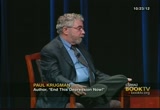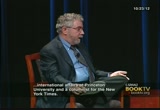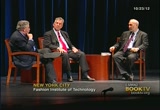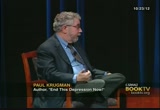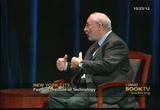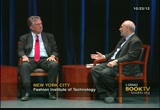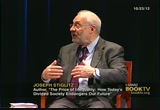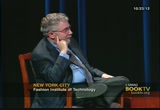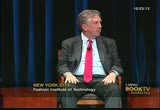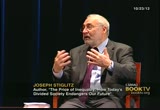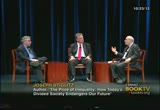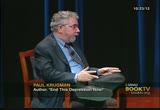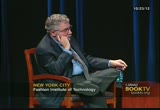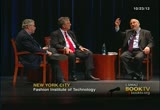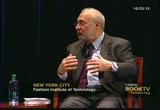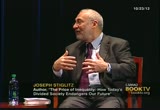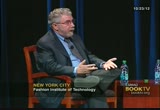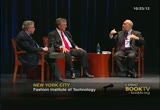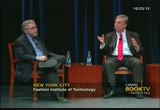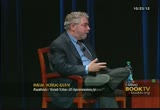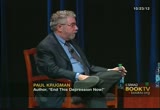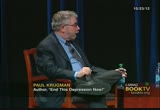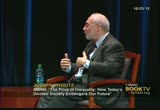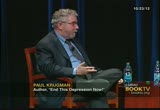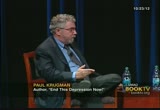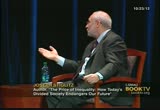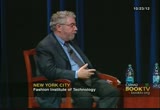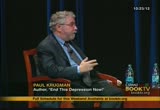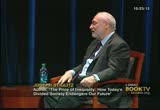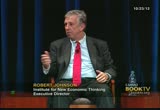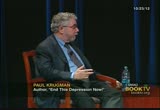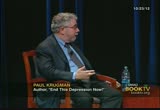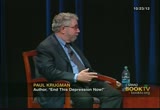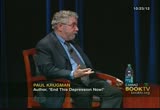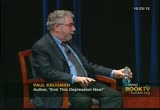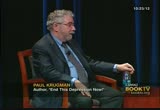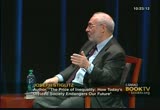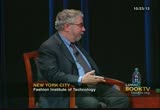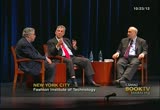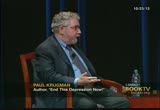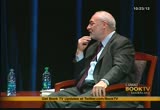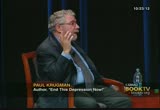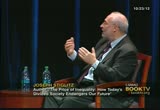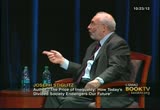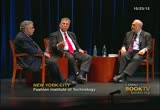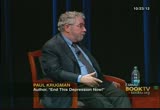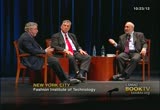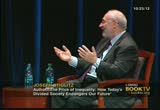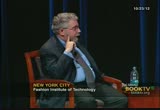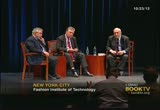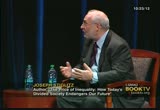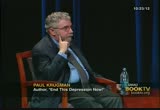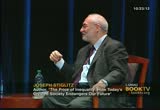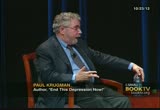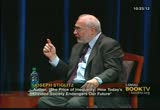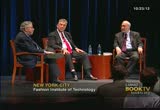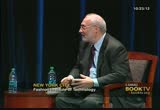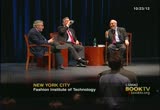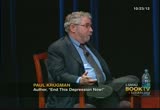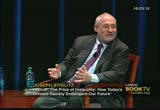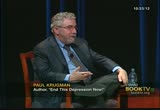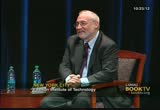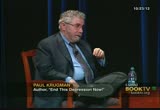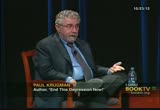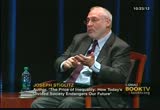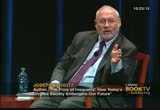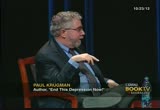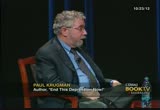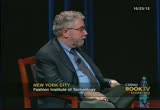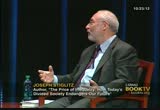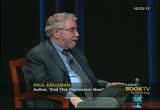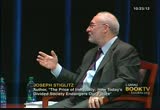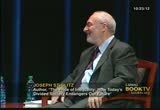tv Book TV CSPAN December 1, 2012 12:30pm-2:15pm EST
12:31 pm
12:32 pm
unquestionably the most in the world today. [applause] in addition to being nobel laureates i would have to say from the vantage point for the economic thinking those would be my finalists. [applause] as you know, we've written a book that pertains to the challenges and circumstance the price of an equality.
12:33 pm
on behalf of them i thank you for your patronage and. let's start with paul. paul, you talked about and this depression now. a lot of people don't believe we could end this now. but agency deutsch human beings have to take on this challenge? something that is recognizably the same kind of animal. we victimize it is the same technology still there and skills are still there. look back to the 1930's and
12:34 pm
there are a lot of people making the argument that there were no easy answers and you could quickly get out of this [inaudible] and the 1939 and these are fundamental problems and if we want to make progress to cut unemployment benefits and things like that the war in europe and united states began preparing. we have our military buildup it would increase 20% 27 million jobs right now. it turns out there wasn't enough spending in the economy they
12:35 pm
could and should have been spending more on the government and thanks to the method it's the same thing right now. there is overwhelming contribution that this is the time having the government spend more would be freed, putting people to work with the unemployed that would be basically doing nothing and essentially it is very easy and very hard politically because it is hard to persuade people about the need to do that which is why some of us books. [laughter] >> some of those would argue it's like a sugar pill for the transient work of time and then you fell back. i think it's a very interesting
12:36 pm
story. why did little more to, why didn't we strike back in the depression? in fact there was montgomery ward was a major kept waiting for the depression to comeback basically lost their position in the marketplace. it is the private sector debt if you had the debt that left people stranded with too much debt and that happened during world war ii that we had first of all the unemployment that made it easy for people to pay
12:37 pm
down debt plus a significant amount of inflation to reevaluate the debt so you can into world war ii for the project that and household debt relative to the income they were well under half the best thing you can do if your problem is excessive. then it doesn't come back it's not a sugar high it is more an essential nutrient there are a couple other factors to add. there is in some sense for savings during the war and they
12:38 pm
can spend at the same time part of the problem in the great depression was that we had to move people from agriculture and to the industry we have a success because we increased the productivity enormously in the 19th century we still that 60 to 70% of people working in farming down to 30% we had to move them into manufacturing and didn't have the resources to do it in the war we began to equip people for this new model of the centro
12:39 pm
-- middle of the century. so we gave them education made this new economy. so it wasn't that the government was spending. government and intentionally in a sense was restructuring the economy making it prepared for the post war period. as also an interesting book in the period in the 30's the government was actually giving a lot of investment and that increased productivity and that after the war it increased their returns to the investment in the private sector and so it created a context that was done during the war that said we had public
12:40 pm
spending provided a context with higher returns. this is an important point. in general, we've got this notion that the sector is complementary to the private investment. i mean, there is a lot of things that people will do if they believe there is an adequate transportation network if they believe that they are going to have skilled workers available because they have had good education to be sure. >> i tend to strip down to the minimal story and would be just about the debt and of course what we are doing right now we have states and government cancelling infrastructure projects because it's the opposite of how we got the great depression. and in fact we haven't focused
12:41 pm
on the talks about austerity. we don't talk about it but we are practicing. >> if you look at the measures there are 700,000 fewer public employees than we did before the crisis where if we had a normal expansion corresponding the increase in the labour force we would have gained about 1.2 million employees but there is a big gap there that is caused by this kind of austerity that we already have. to me that danger is if romney gets elected, they might actually do what they say they might do. the remarkable feature found that your best hope is one of the candidates in his plans. we sit now on all stagnation
12:42 pm
this couldn't be for the distribution process on what they call the research writing the wages down weakening the bargaining power. inequality has become a serious problem in the united states. what's interesting is while paul has been arguing about it and i've been arguing with for a long time as we've gotten so serious that even the economists realize that it is a serious problem. when they say it is a serious problem, you've got to believe it. it's my job to take them on. so, and one of the reasons that it weakens the economy and emphasizes the problem right now is the lack of demand. lack of total demand coming and
12:43 pm
that means people are not buying as many goods and economies and capacities as produced and that leads to unemployment. the problem is if you transfer money to the bottom of the economic pyramid to the top, the people at the top save about 15% of their income and the people at the bottom spend everything. they need to spend everything to get by. so we engage in that kind of transfer that lowers the total aggregate demand, and there is now a vicious cycle going on that because of the high unemployment, the wages are being drafted and the sharing wages is weaker than it otherwise would be. so that in turn weakens the demand coming and even before the crisis in comes in the middle or not doing very well.
12:44 pm
the median income today is lower than it was a decade and a half ago so there is a vicious cycle in place where the weak economy leads to more inequality. >> i don't want to go too deep. i'm not totally persuaded because in fact the overall savings rate even though -- even though it is still well below what it was, you know, 30 years ago we used to have the private savings and even now it was zero for a while, it's about four now. so there's something -- if the debt issues are real, inequality leads many people to vote to attempt to maintain the middle class that above all have a house in the neighborhoods so
12:45 pm
kids can have a decent school. but there is a story that is rather than just a simple mechanical -- >> with the point i guess that we should be aware of is a lot of the discussion talks about the american consumers coming back. and before the crisis, the savings rate -- >> that was obviously not sustainable, and as one of the predecessors but which is not sustainable the topic to be sustained. >> this is something that cannot go on forever. it will stop. [laughter] >> so, dhaka point is if you roughly divide the population up toward 20% it saves about 50% of their income but they have about
12:46 pm
40% of all the income and just do that arithmetic we should be expecting a 6% savings rate rather than 4.5% that we have now so it's relative to what we might have expected, so and it's even conceivable as people get adjusted to the new standard of living that we will see their rates increase in the next 4.5% level and that is another reason why we should be worried over this long recession that we restore the forces in place on their own that are very weak. >> with regard to inequality we talked a little bit about long slump. but other dimensions to you see? >> there are lots in the
12:47 pm
inequality. the income that is going to the top, the holding out in the middle, and the increase in the number of people in poverty at the bottom. and each of them have their own what causes. at the top it's gotten a lot of attention, 99%, 1%. one of the factors that is to say even an economist has recognized and i talk about in my book there are a lot of income at the top that comes from what economists call rent seeking that is to say things like the power activities people try to grab a larger share of the pie rather than try to make the economic pie bigger. other examples besides the monopolists get the profits by reducing production rather than
12:48 pm
restricting the production. other examples in the financial sector the credit card pervvijze and predatory lending arguably it was making even though war and stifel and paul volcker said it wasn't a single financial innovation that has led to the increase in productivity for the atm machine and what is wrong with the atm is a british innovation and so the fees from the dollar to $3. so, that is another example. the ceos have been taking advantage of the governments to
12:49 pm
increase the share of that corporate income. more revenues have become that much more productive or not much more productive than the ceos and other parts of the world. but what they have become is better at getting a larger share of the pie. you have to admit there is a certain amount of cleverness but it hasn't led the economy to be more efficient to the investment or r&d spend on their salary. >> i like to do the division to take the u.s. economy since the early postwar years and roughly divides about in half. the first era was the legacy of the new deal of the corporations that viewed themselves as a coalition of stakeholders rather than just roofless capitalism strong labor unions of course
12:50 pm
tax rates of the top and then a second era of financial capitalism, deregulation and capitalism and there's a widespread belief to talk to people. it explores the growth and the higher efficiency that must make everybody better off and it's not true. growth was slower in the second half and because the big instance stopped being spread to the general population or went to a handful of people at the top. the archetype is that they are actually setting it too low. it's not the 1 percent, it is the .1% for people that needed and in the earlier period, paul was absolutely right in the earlier period the quintile,
12:51 pm
every group in the population was growing but the bottom part was growing faster than the top. today it is not that way. gdp doesn't really give you a good measure of what is happening through the economy and the society. so, while that one-tenth of 1 percent has been doing very well, the median income is lower than it was a decade and a half ago. it is as low as it was two decades ago to go to the top. so, it's clear that in the ways our economy hasn't been functioning as well as it did in the period of which we were growing together. >> you are one of the leading thinkers. we have seen a tremendous amount
12:52 pm
of fight in ohio just in the last month or so between romney and obama and where is china all of this? >> so there are several different pieces. one of them going back to the economy, we used to have much higher practices than we do now. how were we able to have full employment on that? we did not have the system of the budget deficits what makes it so much harder and just to sort of duty had enough, it is the persistence of trade deficit least not have one and now we do and that is a big drag on the economy. which hasn't been better actually the trade deficit is actually significantly down but not all. we have had some that have become more competitive that is the front on which we need to
12:53 pm
work. the political debate hasn't kept up with the reality it's no longer the quarter of that anymore. it's the broadest of countries some that need to be worked on and the next president isn't just china bashing but what do we need to do have a world that is everybody trying to run a trade surplus which the government believes it is possible. [laughter] >> then there is this issue of trade and income inequality. and there's a similar level that presumably had relatively little to do with the distribution. if you make -- canada sends assembled cars back to the united states that is and when
12:54 pm
to be making a big difference to the deficiency. now we do a lot in the countries that are substantially lower income and are selling less labor-intensive products that are increasing the inequality and come through the skull the differentials and it's not simply put part of this revolution ourself. the trade is the income inequality because the numbers are just not big enough which was true. the question is what you do well it? there are a lot of reasons not
12:55 pm
to have protectionists, certainly not to have a general return but if nothing else because we're supposed to be global citizens, and for the very poorest countries having access to the market is critical. then bangladesh has its head above water. to do a decent society with a strong social safety net. it is creating programs to give people the skills -- the basic standard theory is with open markets it could as a whole be better off. that is really the problem that found the advocates of the globalization of the same time that they have been talking about the wonders of the liberalization that has been a
12:56 pm
team to compete you have to strip away the social safety net. and in that sense they are hurting the people in the middle and at the bottom. >> germany is doing relatively well in the crisis. they are doing relatively well, and they will discover that they had some problems, but what is really amazing is to watch the conservatives in this country about germany as an icon that austerity which they really don't. but why is germany able to export so well and pay higher wages by our standards? they have a very extensive welfare state to a level that is beyond the wildest american progress is that what they have is among other things, very good technical the education. a very close collaboration between the educational system and the industry and government,
12:57 pm
the system of corporate governance that is much more like what we used to have in this country represented on the boards. all of this suggests if you really want to be able to get higher in the global economy want to move in the opposite direction from all the people say that we must you actually want a more integrated and more cohesive society. >> they have done much better in this crisis and they've grown faster in the they've been more stable. >> if you guess we'd in and look at what they do and you just describe they put that in front of the conventional wisdom we would say there must be grass growing in the streets but they can't possibly survive the economy. there were just sure.
12:58 pm
fish with it doesn't look like a desperate place. >> coming back to the issue of inequality and talk of germany because i think that we have a lot of the same in the right direction but they haven't with the scandinavian countries and the result of that is that while 30 years ago they were in the middle of the event. they were one of the better countries. they were not as good as scandinavia but they were now moved into the metal and the point of this is to the large extent, inequality is the result of what we do. it's not just market forces. market forces are in place in
12:59 pm
scandinavia and in germany and the u.k. and reshaped those market forces, and the way we shape those market forces has been the result of the least equality of opportunity contrary to our image of our self. it's really a myth. the countries that have imitated the united states have done like the united states. the u.k. used to be in the middle of the elite table and now we are expecting of the income inequality whereas it struggled and inequality has increased a little bit but it is still the least -- the most the quality of opportunity. ..
1:00 pm
1:01 pm
choice about what you do after words as well, providing universal health coverage or provide decent support or an educational system that is well funded for everybody, not just people in the right neighborhoods. >> and the tax system is obviously important, not only for inequality opportunity, but also growth. so for instance if you have a tax system like ours where speculators are taxed at a different rate than if people who work for a living or from any into a bank account in the cayman islands rather than peak united states, you have extended the rules not only to give lower taxes, tax rates to those who avail themselves of these, but distorts the economy and you
1:02 pm
wind up with more speculation. the money isn't in the cayman islands because it grows better in the sunshine. lack of sunshine, is the reason people keep their money there. >> i had a conversation with someone from the financial industry trying to make the defense about things like carried interest which isn't investment income but gets taxed, there's a lot of effort put in with cancer in return, and i couldn't help, you know what else involves a lot of munster in return? renting books. i don't get the tax break and you get the tax break. >> just to clarify the question of very interesting, when a private equity or hedge fund earns money from their customers
1:03 pm
they earn a fee, that is their income. they are allowed to defer that and i used to work in the industry, you can defer that and invest in your business and end on any gain, you pay capital gains from the original fee income to income-tax and now transforming that incoming to capital gains which it is not. this is legalized fraud. [applause] >> confessions of a former hedge fund. healthcare, the phrase you used is how we manage our markets. i remember 41 of the most profound papers i read was the paper nearly 1960's on why health care is different. why doesn't the free-market
1:04 pm
rescue work, what other designs do we have? >> what arrow did, you have this wonderful idealized version of a market that is in our textbooks. which a market is a perfectly efficient way to work, and not necessarily fear which is a different question but there are a bunch of things, assumption that are involved, assumptions that everybody has the same information and everybody knows what they are doing and the buyers understand what the sellers, able to make informed decisions. what can arrow did almost 60 years ago, he said if you made a list of these things, various
1:05 pm
ways in which markets fail, the paradigm doesn't apply, everyone of those applies to health care. healthcare is a nightmare for the problem issues of markets, asymmetrical information of various kinds, people may have a better notion, you have to rely on insurance, and not -- big costs are unpredictable and huge if they occur, very few people can afford to pay for out of pocket so already you have to rely on third-party payers, a big problem for any kind of efficiency. the other kind of situation when they know more about their condition than insurers to, dealing with health care issues itself, those are highly technical, you are not going to be able to know whether your doctors recommending the right thing. there's a whole set of -- the notion that we talk about health
1:06 pm
care, that has become standard language, i am not consuming health-care, receiving a, a patient. you see people taking it -- comparing it to comparative shopping. a heart attack, there's a better deal that the hospital down there. one thing, arrow pointed out one of the things we do in health care, obviously response, we expect an ethical standard for doctors but not from used-car salesman because a used car salesman is selling a utility so you have -- what has happened is health care happens to be on general principle an area where
1:07 pm
free-market principles do not apply. >> what is remarkable about can aero is that for 200 years before he had written, there was an influential idea of the market, pursuit of self interest would lead the efficiency of the economy and can aero was a person who actually through the circumstances under which -- if anybody who talks about the wonders of the free market, he was the one who actually know it was right but in showing it was right he also understood that it was only right under very restrictive conditions and the health-care sector was one condition in which it was never right. my own work in the economics of
1:08 pm
asymmetric -- >> i forgot to mention that. that is the key to understanding his work. >> of the reason the invisible man seems invisible is it is not there. this is a real case of point. >> this is all abstract reasoning, then you look at reality and it is overwhelming. looking across countries the united states has the most market-oriented health care system and the most expensive without getting better results. >> we are ranked 37th in the world. >> within the united states although medicare has been more successful at cost control and private insurers have been, the great thing about america is we
1:09 pm
have everything, all possible assistance here. the veterans health administration which is true socialized medicine, the doctors are government employees, is incredibly efficient relative to the rest of the health-care system. >> you did a calculation that showed a health care system, the best in europe or france or germany, we would have no deficit in the baby boom demographics. >> everyone else -- canada is a single payer system but not socialized medicine. medicare for everybody. and is complicated. but it is a mixture of public provision, public health insurance but much heavier hand
1:10 pm
of government, the same cost as the canadian system but spectacularly good outcomes relative to anybody and britain has a system which is pure socialized medicine and the outcomes are a little better than ours. the cost is 40% better. all of these, if we were able to emulate these things we would be able -- our budget problems would be gone -- and it defies -- one of our two presidential tickets, the signature proposal is to take one of the parts of the system that works pretty well and privatize it. [talking over each other] >> let's make sure nobody gets to do what i did as governor of massachusetts which is privatize medicare. privatize and underfund which is
1:11 pm
incredible. it is a rejection of both theory and evidence. that is pretty impressive. >> when you look at this interface between medical costs and budget, this idea that we have to have all these commissions like simpson-bowles and shares between spending, why don't we just have health care costs? why don't we looked at in the eye? >> that would be death panel. >> i also thank the reality of american politics is the drug industry's, the insurance industry is very influential and has beaten back reforms over and over again. one provision, one line almost in the medicare drug bill that
1:12 pm
provided prescription drugs for medicare, it says the government, the largest purchaser of drugs in the world couldn't bargain with the drug companies, it is a gift to the drug companies over ten years of half-half a trillion dollars. anybody serious about dealing with the deficit, that is a good place to begin, but hardly talked about. >> it creates an interesting problem, how much imperfection are you willing to accept? little bit of a dilemma. a lot of us -- i really think health care reform should take the form of single payer and medicare for all is where we should go. but that wasn't on the table. the question is we have this
1:13 pm
plan which became the genesis of obamacare which is run through the markets, a rube goldberg device that tries to get the effects of a single payer system without a single payer but should have a public option sewage is not entirely the playing field of the insurance company and the public option, you still support is and in this end yes you do because the important thing right now is for us to establish the principle of universal health care and once that is in place there will be a lot of pressure to make it more e efficient and work better and manage to squeeze insurance companies out of their controlling role but get it in place and that is at stake. >> some people would say we had forty-seven million uninsured and came on to the health care
1:14 pm
plan and that swarmed into a budget problem. >> the amazing thing is the uninsured in america are young adults who are not expensive. the expensive people are covered under medicare. the other aspect is america is not so inhumane that in the end when the need is desperate they do get into a hospital, but the cost gets shifted in the complicated accounting to somebody else. selling fact one of the reasons we have such an inefficient health care system is we don't provide care to large fraction of the population. >> the amazing thing, getting to it sort of universal health care system, despite the absence of a public option and the compromise
1:15 pm
made it is not a big budget. they were able to pay for it with relatively modest savings and the little bit of extra taxation and on balance the congressional budget office says the health reform bill is actually going to reduce the budget deficit and it is not going to lead to huge burdens on the public. that they die, it is very much at stake. if obama is reelected, america joined the community of civilized nations that provide some form of health insurance to all their citizens. if he loses it gets killed. >> we are out of tune to the rest of the industrial countries.
1:16 pm
nicolas sarkozy in france came to columbia and gave a talk about the health care bill under discussion and a student asked him to comment. he said i don't want to meddle in your affairs but then he said i don't understand it. in france we take it as a basic right that you should have access to health care no matter what your income level is. for us, this is the question of a right and left. basic human rights. >> the olympic ceremonies in britain with the dancing nurses, people -- the british love their health system. we think it is a hell hole in the disaster and it is not.
1:17 pm
by the way, the other thing about the politics of it is if we get it almost immediately it will become irreversible and inconceivable that -- >> it is like medicare. most americans really think it is a good system. the joke about obamacare was the person who said keep the government's hands off of medicare. >> don't let the government get its hand on medicare. >> that raises a fundamental issue we have been circling around which is what is the role of government in our society and our economy and for 30 years now americans have consoled a bill of goods that government can't
1:18 pm
do anything well. it is the problem, not the solution according to ronald reagan. therefore if medicare is successful it can't be a government program and the same thing in terms of social security. they find it difficult to believe the transaction costs associated with social security are a fraction of any private insurance company providing annuities and it provides a kind of insurance against inflation and other things that you can't get in a private annuity. that really raises, i think, deeper issues at the center of the campaign. >> there was a study done a couple years ago, people participating in a city, germany, the united states and
1:19 pm
sweden and they asked a battery of questions, the united states respondents distrust of government more than the other countries. one question that stood out is to i trust our government to protect me and the american cancer know was off the scale, ten or 15 points. >> part of the reason for that they be related to the subject of skinny quality we have been talking about, we have such a high level of inequality, economic inequality and inevitably it gets translated to political inequality and particularly given the rules of the game like the rules of the economic game determining how economic system plays out, high levels of the quality, we have of political rules of the game,
1:20 pm
like citizens united that give scope and money we have moved closer to a system rather than one person one vote to one dollar one vote and that becomes self reenforcing so you have more political inequalities that generates laws and regulations that leads to more economic inequality and political inequality. a -- an example i could find, something like bankruptcy law, something very technical that no one is interested in, one provision of the bankruptcy law is that when you go bankrupt, who gets paid first? a big issue. the answer is the derivative. not a surprise because they put it in when anyone else is not noticing who pays attention to bankruptcy laws? what does that mean? it means you encourage that kind
1:21 pm
of economic inequality. at the other extreme student loans can't be discharged even in bankruptcy, so that means the banks do well, but it really discourages people borrowing for student loans and in a country where we have tuition going up the last three years, average state university up 40%, the cutbacks in state budgets, incomes are going down, the only way people can afford it is borrowing and then they realize they get cheated as a lot of them have been, particularly in the for profit private schools, the result of that is if you don't get a job it is a noose
1:22 pm
around your neck. >> what do you tell people now when looking at those tuition mills? and the unemployment levels? >> something like this is such a rarified thing, 9%. >> 1% or less. and to the extent the outcome is, pretty generous scholarships so i don't think that is it. >> i certainly have relatives who are urging them to find ways to not be dependent. have a nephew thinking -- teaching english in japan and staying there into the job market is better here.
1:23 pm
>> this comes back, we have moved off of the question of the economy. among other things when people say can we afford to spend to boost the economy, the costs of not doing that are among others things a lost generation of young people. a terrible job market, people are coming out of school or college or private school into a market that has no use for them. they never get that first job that makes use of your potential, never get started on the latter. we will be paying a price for our inaction in the face of mass unemployment for years because of what we're doing. >> absolutely right. particularly foolish right now, u.s. government can borrow at negative real interest rate. >> the u.s. government sells
1:24 pm
bonds that are protected against inflation and will not devalue and the interest rate on ten year inflation bonds at minus 0.8%. people hate government taking their money. >> once you recognize that and recognize we have higher return investments in acknowledging infrastructure, lookit the infrastructure in new york, a feeling that we are a third-world country, an insult to a third-world country. investments in technology that would really provide the basis, we began by talking about how we got out of the great depression, those investments would be a compliment to the private sector and create jobs now and low growth in the future and to improve our fiscal position because you have positive real returns and the negative real
1:25 pm
costs of the funds, anybody looking at the balance sheet says you are crazy not to do it. >> the greatest city in the greatest nation in the world is linked to all points west by a single rail tunnel completed in 1910 and the project to add -- which runs at 100% and the longstanding project was cancelled when the federal government can borrow at negative interest rates. >> all of these vital resources, do not pay taxes and people are worried -- >> larry summers and brad malone now that he is a free man, has joined me actually. they had a paper making a very strong persuasive case that even
1:26 pm
in purely fiscal terms spending more money now is positive. but it will do to the long-term economic growth will more than pay for itself in future tax revenue because the darling cost is solo and long term shadow of mass unemployment is quite large. conversely cutting back is self-defeating, it worsens the fiscal situation and what happens is people say got to inflict more pain because it really is like the medieval doctors, and treat people by bleeding people, so they got sicker and you lead them some more. >> i'm getting depressed with you guys. i have to turn to the audience now. people have questions. the microphone is in a couple places. please come up.
1:27 pm
>> if i could make an observation before i pose the question, i appreciate the opportunity to hear three brilliant people like yourself discuss the issues. i suspect if we had three equally distinguished economists of different political persuasions we would have three different answers to different observations so let me get to my question. number one, you think the problems of the 99% are the result of what the 1% is doing to them. three questions and i will disappear. the first question, the problems of the 99% result in what the 1% has done, secondly, what do you think the appropriate maximum tax rate should be for the highest income in society and free, how would you narrow the income differential between the worker and the ceo. 30 years ago the differential was 30 times. to date is 500 times. how would you go about narrowing
1:28 pm
the differential? i assume it has occurred to some degree because china has put down the wages of american factory workers and why ceos make what they make is an issue of governance. those three questions if you could shed some light on your opinions. >> 1% cause the 99%? >> what i tried to explain before is the difficulties of the 99% are a result of a whole host of different things that we talked about. right now the major problem is unemployment but education, a whole host of financial sector deregulation allowing predatory lending, predatory practices and things like that. you can say a lot of these are the result of the way our
1:29 pm
political process has passed rules and regulations and supported education are not supportive education and that is affected not by the 1% but by the way money, the influence money has had in the political process so lot of the reply is as a result of that. i won't sale of that. on the issue of ceo pay relative to the share order -- ordinary workers, a lot of that has to do with corporate governance. if we had stronger laws about pay, that would be curved to some extent. >> different ratio here. >> it brings a strong say in pay law, very different ratio and companies are just as efficient as our companies. >> a stronger labor movement. we have had a very heavy tilt of
1:30 pm
policy against labor organizing and that is an important restraining factor. the other question, 73%. peter diamond, a former colleague of mine and nobel laureate was deemed to unqualified to be on the federal reserve board by republicans in congress, they don't have to take the exact number but he did -- that is what -- there's a very strong economic argument that says we should be taxing very high incomes at rates that yield revenue. >> one more factor -- >> it doesn't quite -- we don't know. above my pay grade. >> after this book sells?
1:31 pm
>> right. this is a clear case that the notion that you need tax breaks because of these wonderful spillovers is just not right. is not borne out by fear your evidence and much higher rates at a high end are perfect example. >> we were talking about before 1980, before 1980, the top tax rates were separate. one more thing i would add is you ought to think a little about source of income at the top and a lot of those forces and how we power all kinds of things, if you could target taxes on that kind of rent seeking to actually generate income and improved economic conditions. most economists say to the extent you can actually target those kind of rents as opposed to 100% as you can.
1:32 pm
>> i sense that if you have a higher marginal tax rate at the top -- >> there's a fair bit of evidence that one of the reasons we had this explosion of corporate pay, executive pay is the gaming of the system that ceos now do in order to get these highly paid checks, when the tax -- >>, saudi goes both ways, when you have more economic inequality in the political process leads to less progressive taxation but also when you have less progressive taxation, you wind up with an economic system with more inequality, try to gain the
1:33 pm
system. >> thank you. sorry. hello. thank you. so. there has been some criticism of the notion that economists as a group, the leading the matters is seeking so-called rational solutions, inefficiency, i am getting the strong sense that you are not exactly in that camp, and the moral code. and the underpinning and reviewed, and i wonder if you could articulate what that moral code is, for economists to live
1:34 pm
by. [laughter] >> i don't think the moral code for a person is any different friend economist. let me answer -- what is your social vision? what is it you want to see? i don't know. i am more or less without being -- think about society as if you were devising a society without knowing who you were going to be and think about hypothetical availability and if i didn't know whether i was going to be born the son of corporate executive or the son of a migrant worker, what kind of society i would look for given
1:35 pm
that it is really uncertain and it is like the golden rule, just consider the possibility, what would you want if you were going to be someone else? doesn't have to be superformal about but those are great wines, one of our two presidential candidates starting the social philosophy and all of that. >> let me just add one other thing. some of the arguments we have been talking about this evening say that no matter what your view or moral philosophy is, the level of inequality we have achieved in the united states is bad for almost all of us. we have actually gone -- pushed the boundary beyond the point where all of us in a way will
1:36 pm
suffer. if we thought about this in terms of our enlightened self-interest, they would realize -- >> as a long-term study and socioeconomic status, i always think in this context it turns out in america if you look it students by tests for and track them for a number of years it turns out in america right now, a dumb rich kid is more likely to graduate college and a port smart kid. that is telling you enormous waste of human potential. there are millions, tens of millions of young americans who could be doing great things for themselves and the rest of us who do because we have such an unequal society are being denied that chance. >> equality of opportunity where we are performing the worst of any --
1:37 pm
>> the notion that divorce in quality results from quality of opportunity, when the results are so unequal it turns into equality of opportunity as well. >> in the joint venture with the theological seminary, taking off the first, discussing in the book, continuing that and filming-at economics.org and asking the question, an invitation to the next session. in nation of identity. question on this side. >> when i look at the last decade i see $5 trillion in debt run up by the georgia. administration. this $10 trillion seems to be a legacy with the strong involvement of fiscal pump
1:38 pm
running and yet we have a legacy of economic problems that our sovereign debt is gdp, this is the point at which at least in europe investors have begun to question the capacity. i am curious in what way -- a solution that past pump priming was not and how can be financed through >> i don't buy that. look, we have a stimulus bill which was about $800 billion. that is a very small part. none of the arrest was the result of deliberate efforts so where is this coming from? rest of it is we have a large
1:39 pm
amount of debt that was -- a large amount -- we ran deficits even during good years. i don't think it is a good idea. why? because george bush wanted to give tax cuts to the high income people, a couple of unfunded words to become priming. and then we had a collapse of revenue that took place after 2007 which is the result of a severe downturn in the financial crisis which reflects part of -- at least in part financial deregulation. failure to understand you need to have some oversight on a financial system and all of that so the notion, people talk as if the current--is a keynesian policy. we got to the current level of debt through a combination of
1:40 pm
deliberate policy of starving the beast when the economy didn't need a budget deficit coupled with financial policy in this economic crisis, all of that said, the notion that bad things -- there's a red line on debt that we are close to is not borne out by the evidence. >> this -- look at who is in trouble right now in terms of the desk and it turns out to the only countries that no longer have their own currency, they are a special problem. advanced countries that don't have their own currencies or monetary independence in current events and historically able to handle debt levels -- >> partly propagated by well-known --
1:41 pm
[talking over each other] >> reinhardt and robot have a wonderful book about the history of crises but then after the book they throughout this very casual paper which was just raw correlations saying countries with high debt had and you look at it and it looks like it is the other way around, low growth end up with high debt. not up to the standard -- >> the united states had a debt to gdp ratio in world war ii of 30% and it was followed by the highest period of economic growth that we had and we brought the debt down relatively quickly. the notion that there's a lot magic number that would solve the problem is off. what we should have asked the question, what would have
1:42 pm
happened -- [talking over each other] >> one of them is going to say that is a really good question. >> which would have happened if we hadn't allowed the deficit to increase? if we had tried to do a herbert hoover kind of policy of splash/and expenditures as the tax revenue went down. we did that experiment. the imf force that experiment on a number of other countries and the ecb in europe forced that on "end this depression now!" -- on grease and the country's go into deep pressure and the other is the deficit doesn't get down as much as anybody hoped. i was surprised that they are surprised because it was perfectly anticipated that they would fail.
1:43 pm
>> thank you for the opportunity to ask a question. my question is on a different topic but it relates to the kinds of economic ideas some u.s. groups are promoting. i mentioned imus to and from georgia and this summer and went back and went to an economics cam funded by the tea party organization and they were promoting libertarianism and there has been the emergence of orthodox economy back home which has led to less taxes and increased inequality. my question is how do you discuss alternatives to market funds which are so sensitive to their historical experiences? >> i missed what the country
1:44 pm
was? >> georgia. >> it is not a surprise that people in countries where there was excessive government intervention would react by going to the other extreme. i am not surprised but hopefully, in particular there is a real risk they go from one orthodoxy, fundamentalism, to another kind of orthodoxy, fundamentalism. and i hope one of the things i have tried to do, try to say, look at market fundamentalism doesn't work like the kind of market that doesn't work, you need to have a balanced role and some of the things we are talking about are some of the rules government can play but we don't have to pick up the theme of pope's book. libertarian would say just let
1:45 pm
the market work and there are people who have said that, don't do anything. just -- just let the ashes burn and one did in the new york times in chicago just let the markets have their way, they will all collapse and out of the ashes will come the new economy. meanwhile there will be a lot suffering. [talking over each other] >> burn baby burn. >> maybe the thing to say, we have now been, we are now almost 5 years into this crisis and different economic ideas, people have made predictions, not so much what the number for gdp was
1:46 pm
but how things will work. there were predictions. there was a widespread belief 2-1/2 years ago that austerity programs would expand the economy and get government out of the way. that doesn't work. we have different economic doctrines that have been subjected to it. what has survived, what has worked is an economic view of the way things work that supports government intervention. such that it is not just throw them out but look at what has worked in practice and it is not the libertarian market fundamentalist view. >> one aspect, a point we mentioned earlier, one of the standard doctrines of the libertarian is more flexible wages, no unions, the economy is
1:47 pm
going to perform better. the countries in which they have stronger unions and better job protection have done better in responding to the crisis. united states is, quote, the best country in terms of labor market flexibility, hasn't done that well. win is interesting from the point of view of economics, the economic theory, is this crisis has been wonderful. we have gotten a lot of experiments, and we will be able to -- a different philosophy and shutting off a lot of issues. at great cost to a lot of people in a lot of countries. >> this is a question to both of you. what is your view on the theory
1:48 pm
of subjected utility in the economics, it does it describe reality? especially considering your experiences in international economics and asymmetric intervention and other matters? >> wow. [laughter] >> why don't you try, all? >> we have a lot of economics built around the notion of this idealized -- rational man who has a utility, a clear ordering of preferences and you can express as a mathematical function and rational decisions and all of that which obviously is not a twitter role
1:49 pm
description of anybody and the question, it is a metaphor that is helpful for organizing about how decisions are made. the way to do it is to always think about it in the subjective. if it were the case that people were like this they could do this and offers an guidance and anyone, any economist who believes that the expected utility model of decisionmaking a is a literal description of how people make decisions probably should find another profession. nonetheless it is very useful. >> there are two parts of the question, one of them is there are a lot of research over the last 30 years that show that people's behavior in making
1:50 pm
decisions under uncertainty is not well described by the model paul and you mentioned, there are significant deviations for the prediction of that model. on the other hand, when we think about -- the issue of where the probability distributions come from, are they objective or subjective? the view that we ought to think of them as relatively subjective, they reflect our experience the way we see the world based on our experience, there's a lot of persuasion that to the extent we use those probabilities and behave according to them, subjective
1:51 pm
probability establishing that. >> one more question over here. >> thanks for coming. as we discussed earlier, the united states was able to get out of the great depression by government spending in world war ii and many other factors, but currently we are at war and the manung icturing landscape was drastically different than it was and in light of those two points where would you direct spending? >> how i concluded in the book, there are some, there are some natural recuperative forces so there are very few houses in
1:52 pm
this country for six years, housing stock probably. and the housing shortage. was still high by historical levels but a lot of reasons to think that the economy is on the man. if you look at the last year improving labor markets, so the point is the hole that needs to be climbed is not as steep as it was, you don't have to have a wogoverd war ii level stan.ulus get us to a much better economic situation and the kind of stimu >s you do want a lot can be achieved by reversing this austerity we have capiiied out. we both have this and we're down 600,000 government jobs when we should be up by normal growth,
1:53 pm
we should be up more than of million. you can create -- you can create directly 1 million or 1.7 million jobs in o> hing indirect effects due to have a million or more just by basically restoring normal levels of funding for schools for road construction or road repair or the functions of government we already have. we don't nlimd to find exotic projects. we don't need to find something unprecedented to spend on just returning to wear under normal operation gets us to un look at that in half go
1:54 pm
the good news is that we have lots of things we need to invest in, education, infrastructure, retrofitting the economy for global warming. lots of needs that we have so in my mind particularly since we can borrow at negative real interest rates, we don't need to do anything exotica. there is really, let me make
1:55 pm
another important point, the view that it was war spending that got us out, where spending is not any different from any other spending except in one way, we don't have anything left over after you dropped the bombs whereas if you build roads you have something left over. even if you don't do it perfectly it is better to have war spending. the fact is all of this kind of spending would put us in better stead then the spending we had during world war ii. >> i am running short on time here. my staff bag to me, said you have two or original thinkers and nobel laureates, give them the wheel.
1:56 pm
last question, new economic thinking. what economic thinking to you think we should develop? a question for each one of you. >> part of the problem is i really want to ask a question of the younger guy. there's a problem having been in it so long and have a set way of thinking. i think we need a lot more empirical work, a lot more evidence. we are seeing a renaissance, seeing a lot of good empirical works on fiscal policy which was much collected and collected partly because of the audition but also because we had a crippling orthodoxy believing everything must be derived from rational behavior of
1:57 pm
individuals. you can't deride it that way it must not exist. if we adopt a loose jointed or open-minded way of approaching how the economy works we opened the door, i don't think we are ready for a lot of brand new series the we have an opportunity for a lot of people counting house things work and what happens in a recession comes in a recovery or what happens when spending is increased, we're getting a lot of natural experiments, bad times are good for interesting data and that is where i would go. >> there was this great line, you bloged at the conference, new economic thinking seems to consist in large part of rereading old books which is true. there was a lot of forgetting
1:58 pm
ridge we have learned -- history is a powerful tool that in some ways we have been -- a lot of empirical work in economics was being dictated where the data were easy to get and clean but it turns out a lot of interesting events going further back and further afield, internationally we are better about this, particularly in this country is a tendency to do economic research as if america was the only country and the fact that there's a lot of experience out there, economics tend to stay the same across time and across space, not everywhere but a lot. if we had paid more attention, paid more attention to japan in
1:59 pm
the 90s we would not be doing such a bad job right now. >> i don't know where to begin. we have only a limited amount of time, it takes a couple hours to talk about how to begin a new economic thing. the point where i agree strongly with paul is there needs to be more openness in the way that economics is the approach. i am not sure whether they're really relevant focus ought to be on empiric. the problem was low theory was brought to bear in seeing the world, led them to look at the world through the wrong empirical lens. for 25 years, 30 years, there has been a lot of empirical work
2:00 pm
2:01 pm
important is changing the mind set which you approach the data, and -- [inaudible] we didn't the differents of economics seems to be clear. that field that done miserably is macroeconomics and financial economics. these repeals of marc -- macroeconomics had the view that bubbles don't exist. that are efficient. it was the central doctrine of the large part of the macroeconomics. they have models used by central banks which there were no banks. it was very pee call already. how could a central bank talk about macroeconomics without banks? well, they did. and the predictions were very
2:02 pm
bad and the ability to respond to the crisis once it happened was not very good. when it happened they would make statements like don't worry, the crisis is contained when obviously it wasn't. in my mind, as we look across the field, the big failure was in macroeconomics and finance and the financial markets had all these properties and, you know, a lot of people actually believe the models. that was really the big mistake. both in the public and the private sector there was consequences. >> and if you did read the bocks or the old -- the odd thing is if you had a view of macroeconomics based on what was widely accepted knowledge before the super expectations came in and i asked -- [inaudible] that kind of thing.
2:03 pm
actually does spectacularly well in this crisis. there's been there eastbound -- there were obviously a lot of people did that. they came with the things that absurd to a lot of people the notion that budget dpef sit would not drive up interest rates that big increase in the monetary base would not be inflationary. it would be a lower recovery than normal we would be against -- [inaudible] all sorts of propositions which turned out to be worn out by eivelts. the try yufm that a lot of the professions threw in the waste paper basket. it was valid. >> and refer back to economic history the notions that there were no bubbles. >> yeah. >> was quite remarkable. anybody who read as i had one of my teachers was charlie who wrote the -- about the history
2:04 pm
of panics and -- [inaudible] >> and they happened since the beginning of capitalism. one of the things that was so interesting in this -- book he describes in each of these bubbles, each of these booms that the people in the boom knew there had been previous bubbles that broke, but they thought they were smarter than their parents, and that they themselves were not in one of these bubbles. and that was exactly what happened in this case that a few of the people in the middle of the bubble said yes, of course, back in the middle ages twenty years ago we had bubbles, but we're so much smarter than our parents and grandparents and great grand parents, so we would never fall for the kinds of things that they fell for we fell for things a little bit more complicated in many ways
2:05 pm
similar to the same kinds of perhaps they tell them top. and bernie madoff moved on. >> sure. troy to inknockuation the position -- inknock wait the position -- >> yeah. if not -- umm, a little bit of humility here is the powerful thing, and let's see joe too. actually, -- [laughter] that being said accepting that maybe you don't have -- the
2:06 pm
beautiful model you have been teaching are not the only ways to see the world. we had the tremendous -- about macroeconomics. amazing without any -- intellectual arrogance. it's remarkable some of the advocates some of the model that deal so badly have actually written that this the era even now the of macroeconomics. what it shows is that some parts of economics are immune to reality, and they are a religion not a science. and hopefully will be able to make a dent in that kind of --
2:07 pm
that's what and those people will never admit they were wrong but it's -- i'm reading about for light reading i'm reading about -- [inaudible] [laughter] [applause] i think tonight -- [applause] i think tonight we brought a lot of life to this audience and the questions that economics and the challenge behind it. i'm grateful to you both. thank you for the discussion. thanks a lot for being here. [applause] we'd like to hear from you. tweet us your feedback, twitter.com/booktv. and now joining us on
2:08 pm
booktv is an old washington hand and that is ambassador stewart. he's an author, the future of jews is the name of the book. ambassador, why are you writing a book about the future of the jews? >> we have survived 3,000 years of calamityies and we survived and leave thrived and contributed to societies even those that didn't want us. now we have a whole new set of 21st century challenges, and the question is having survived those terrible times, can we now survive prosperity, success, and integration? and i look at this from two perspective, the global forces that affect america, american jews, and israel, everything from the shift of power to united states and the west to
2:09 pm
china and the east hours of globalization in the digital era. how to deal with the 1.6 muslims in the world, the threat of iranian nuclear power, and i also look at internal threats, low birthrates, assimilation, and again, whether we can, in effect, succeed at the time when we are more successful than ever in being integrated to our society. it's a new know mom that. -- phenomena. that's why i wanted to write a book. i wrote it from an israel perspective, i've been to israel maybe forty times. three times this year alone during the carter administrations i was deeply involved in the policy tween the u.s. and israel. i write from the perspective of someone who has relatives in israel and spent many years and times times in israel. it's a unique perspective
2:10 pm
looking from the outside in and the inside out. >> ambassador, israel was one of the few foreign policy issues in the 2012 campaign. mitt romney saying you won't see any sunlight between the u.s. and israel. is the u.s. relationship and vice versa a healthy relationship? >> it's a remarkable relationship between one of the nations that have the smallest majority in israel and our great country, and it's almost a mystical relationship when you think of how much support we have showered on israel and how much support we get back. it's due to the fact that this is not just jewish support, we're only 2% of the population in the united states. it's because we have shared values, shared enemies, and islamic terrorism. that many people in the united states view israel as the holy
2:11 pm
land not just jews but non-jews as well. there's a remarkable time when there is so much polarization between the republicans and democrats. it's one of the few foreign policy issues that actually unite democrats and republicans. >> what -- the future of the jews, is your book title provocative in any way? do you mean to be? >> i mean it to be. the question is can of people who have survived calamities for 3,000 years in effect accept success and full integration, and how do you react to that? it's optimistic but realistic. it looks at the demographic of israel and ask whether 2.57 israels can control 2 million palestinians against their will. it looks at low birthrate and the low replacement levels with the inner marriage. it threatens to reduce the number of jews.
2:12 pm
there were 17 million jews in 1939, in a world of 2 billion. there are 13.5 million because the holocaust in a world of 7 billion. and so it looks at at provocative way. i'm optimistic that we can survive the external theft. the shift of power, globalization, the nuclear threat from iran. the globalization we're not alone, the united states and the west are in the same battles ourselves. it's the internal threats -- the internal cohe thinks that is at risk ironically of success. that's the thesis of the book. i'm optimistic that we can do it but there are challenges. >> you were involved in the carter administration, if you could, just recap what you did for the president. >> i was the president's chief
2:13 pm
domestic adviser. it was my recommendation that create the holocaust museum, the commission that lead to that, worked on the soviet -- during the clinton administration, i was ambassador to the european union, and i did as undersecretary all the holocaust negotiations. i negotiated $8 billion of compensation from the swiss, german, austrians for slave labor, insurance, patrol, restitution and the like, and here i'm really trying to look at this from a perspective of someone who has been a senior government official but also a leader in the jewish community. that's why the book has been endorsed by president clinton and harris. >> stewart, the future of the jews. how global forces are impacting the jewish people, israel, and the relationship with the united states. it's booktv on c-span2. with about a month left in
2:14 pm
2012, many publications are putting out the year end list of notable lists. booktv will feature many of the lists. focus on the non-fiction. these were including in "the washington post best book of 2012. this year's national book award winner for non-fiction "behind the beautiful forevers." katherine boo profiles. the late reporter and war spond recalls the capture in lib are libya and return to his grandfather's estate in the national book award nominated "house of stone." in "marigold" james history and swcial affairs professor at george washington university reports on the peace plan dubbed "marigold" and aim to end the vietnam war in 1966.
120 Views
IN COLLECTIONS
CSPAN2 Television Archive
Television Archive  Television Archive News Search Service
Television Archive News Search Service 
Uploaded by TV Archive on

 Live Music Archive
Live Music Archive Librivox Free Audio
Librivox Free Audio Metropolitan Museum
Metropolitan Museum Cleveland Museum of Art
Cleveland Museum of Art Internet Arcade
Internet Arcade Console Living Room
Console Living Room Books to Borrow
Books to Borrow Open Library
Open Library TV News
TV News Understanding 9/11
Understanding 9/11



